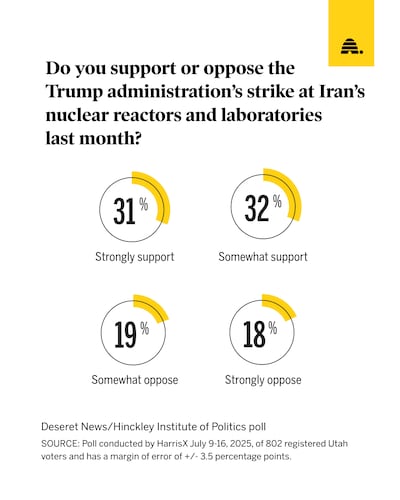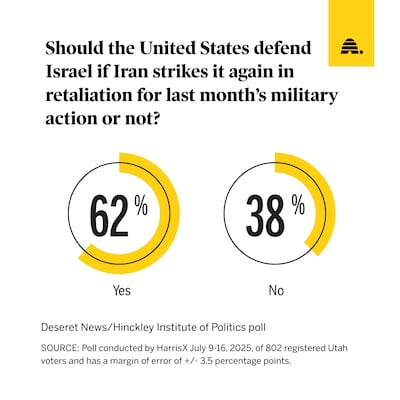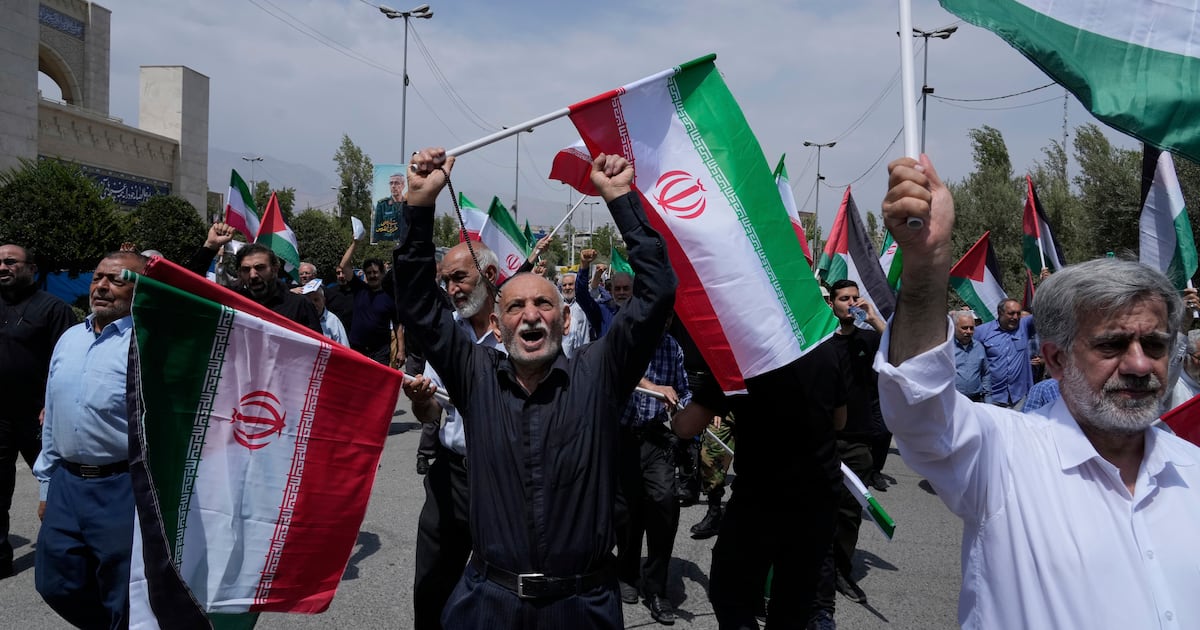6 in 10 Utah voters supported Trump’s decision to bomb Iranian nuclear sites in June.More than 80% of Republicans agreed, despite criticism of Trump from MAGA influencers.Ambassadors Flake and O’Brien and Sen. John Curtis said Trump’s Iran strikes will deter enemy nations.
A majority of Utah voters continue to support President Donald Trump’s decision to bomb Iranian nuclear sites a month later, believing it severely damaged the nuclear program and reestablished deterrence, according to a Deseret News/Hinckley Institute of Politics poll conducted by HarrisX.
Approval for the president’s actions appears to be largely determined by partisan affiliation, with overwhelming support among Republicans — suggesting that infighting among MAGA influencers over Trump’s Middle East policy may be isolated mostly to social media.
Some of the nation’s top experts on foreign policy told the Deseret News they were not surprised by the popularity of Trump’s peace-through-strength approach. But there are still unanswered questions about how the administration will resolve nuclear negotiations and Israel’s war in Gaza.
Is the GOP divided over Trump foreign policy?
More than 6 in 10 Utah voters said they supported the Trump administration’s strike on three Iranian nuclear enrichment laboratories earlier this summer, the Deseret News/Hinckley Institute poll found.
“Utahns have always stood at the crossroads of conviction and courage, and it’s no surprise that we overwhelmingly support decisive action to defend America and our allies,” Utah Sen. John Curtis said in a statement to the Deseret News.
“With assets like Hill Air Force Base, our state plays a vital role in advancing national security and projecting strength abroad. Peace through strength works — and Utah is proud to be a cornerstone of America’s deterrence strategy.”
 Anna Owens, Deseret News
Anna Owens, Deseret News
Roughly the same percentage of voters said they are closely following the conflict between Iran and Israel. A slightly smaller share, 58%, said the United States has done the right amount to respond to the conflict between the two countries.
Views on Trump’s foreign policy correlate heavily with party identification: 83% of Republican respondents said they support Trump’s move, compared to 28% of Democrats and 49% of independents.
“For many, this response seems less about long term views on nuclear issues and more about confidence in the leadership making those decisions,” said Jason Perry, director of the University of Utah’s Hinckley Institute.
But it also indicates Republicans are more united on Trump’s approach than online infighting would suggest.
Shortly before, and immediately after, America’s stealth bombing operation on June 21, some of the loudest voices in the “America First” ecosystem criticized Trump’s support for Israel and intervention in the Middle East.
Podcast host Tucker Carlson said if Trump intervened in Iran it would represent “a profound betrayal of his supporters,” could “end his presidency” and might spark “a world war.” These talking points were highlighted by Tehran Times.
Trump subsequently took to his Truth Social platform to call the former Fox News personality “kooky Tucker Carlson.” But Carlson has continued to split with the president, along with some Republicans like Georgia Rep. Marjorie Taylor Greene.
“While there are disagreements among conservative voices on social media, the support we see in the poll suggests that those divisions may be overstated, at least in Utah,” Perry said.
Was the Iran air strike effective?
The Deseret News/Hinckley Institute poll, conducted by HarrisX from July 9-16, showed a majority of Utah voters who believed the attacks on Iran were successful in accomplishing their objectives.
Of the 802 respondents, 55% said they thought the strike did severe damage to the Iran nuclear program, including 68% of Republicans, 30% of Democrats and 47% of independents.
The same share said the strike served to restore American deterrence in the region and elsewhere. Again, support was polarized, driven by three out of four Republicans, while just 21% of Democrats and 35% of independents felt the same.
After Iran rejected “a great deal” to end their nuclear program, the Iranians learned the hard way that Trump “clearly is not Biden or Obama,” said Amb. Robert O’Brien, who served as Trump’s national security adviser from 2019-2021.
In an interview with the Deseret News, O’Brien said that Iran had no choice but to deescalate after Trump took his aggressive stance, which, in turn, will help to deter other foreign adversaries around the world moving forward.
“I think that Xi Jinping and Vladimir Putin and Kim Jong Un were watching very carefully, and what they saw was an incredibly disciplined operation,” O’Brien said. “Trump showed he could strike anyone, any platform, any weapon system, anywhere on earth.”
What “some of the MAGA folks” don’t understand, according to O’Brien, is that Trump’s forceful, but precise, operation was never going to produce “troops on the ground in Iran” or an effort at nation building, like in Iraq or Afghanistan.
O’Brien shared the view of the most recent American intelligence assessments that the bombings set back the Iranian nuclear weapons program by “at least several years.” But the program will likely slowly rebuild, O’Brien said.
Are negotiations still possible?
Former U.S. Ambassador to Turkey Jeff Flake agreed that Trump’s decision does “establish deterrence,” and was “justified” if the intelligence showed Iran moving toward the development of nuclear warheads.
But there won’t be a lasting guarantee of nuclear non-proliferation unless the U.S. can negotiate the return of international watchdogs to monitor Iran, Flake said, because the country retains many of the experts behind their nuclear ambitions.
“The good thing is because of Israel’s bombing and our assistance Iran has a very, very weak hand,” Flake told the Deseret News. “They’re in a position where they’re going to have to make a political agreement.”
In Utah, voters of both parties agree on what form nuclear negotiations should eventually take. According to the poll, 94% of Republicans and 83% of Democrats said Iran should not be allowed to obtain a nuclear weapon.
A majority of each group — 74% of Republicans and 57% of Democrats — said a negotiated deal with Iran should permanently block nuclear weapons development, and not just delay it for a number of years.
Neither group is confident that U.S. negotiations to keep nuclear weapons out of Iranian hands will succeed: 51% of Republicans and 61% of Democrats said it is likely that Iran develops a nuclear weapon within the next year.
However, professor Quinn Mecham, the associate director of Brigham Young University’s Kennedy Center, is confident that Trump’s decision to bomb Iran at the request of Israel has left the administration’s nuclear talks “in tatters.”
“Iranian domestic politics can’t effectively move back to where it was in the negotiations after this,” Mecham said. “The calculation seemed to be that even though that might be the case, it might be worth it to degrade their nuclear capability. But I think in the long term, there are negative foreign policy consequences.”
Prior to Israel’s 12-day war against Iran, the Trump administration held a series of high-level meetings with Iranian officials that Mecham said promised to curtail their nuclear program in exchange for reentry into the world economy.
Israel likely hoped their attacks on Iran would push the U.S. to back them up, according to Mecham, “scuttling the American negotiations” and ultimately empowering “extremist voices” in the Iranian political system.
Future U.S. aid for Israel
Over the past 21 months, as Israel has expanded its military operations from Gaza, fighting Iranian proxies in Lebanon, Yemen, Syria and Iran, the American ally, and sole democracy in the region, has faced calls from around the world to scale back.
Trump, like his predecessor former President Joe Biden, has largely held firm in his support for Israel. Utah voters also show a continued commitment to supporting Israel’s operations, with more than 60% saying the U.S. should defend Israel if Iran strikes again.
 Anna Owens, Deseret News
Anna Owens, Deseret News
“Israel is our most important ally in the Middle East, and we’ve shown again and again that we’ll stand by our ally,” Flake said. “Having said that, … I think you would find American support broadly for the U.S. to use its influence with Israel to push them harder to open up aid corridors.”
Information coming out of the Gaza Strip has repeatedly proven difficult to verify, as the Deseret News has detailed. But recent reports tell a consistent story of an emerging hunger crisis in Gaza, with flour prices increasing up to 80-fold and food distribution failing to reach certain areas.
Israeli authorities have accused Hamas, the terrorist organization that previously governed Gaza, of stealing or diverting aid. While the Hamas-run Gaza Health Ministry has accused Israel Defense Forces of attacking residents gathering to collect it.
President Trump’s Middle East envoy, Steve Witkoff, visited an aid distribution site in Gaza on Friday. Witkoff and U.S. ambassador to Israel Mike Huckabee said they were there to help Trump plan how to deliver more food and medical aid to Gaza.
There are “100%” signs of the beginnings of famine in Gaza, Mecham said, adding that the U.S. is one of the few countries in the world that “has leverage over Israel” to help prioritize alleviating the problem.
According to O’Brien, the humanitarian crisis in Gaza rests squarely on the shoulders of Hamas, which has refused to return the 50 remaining Israeli hostages as part of a U.S.-brokered cease-fire deal.
Images were released Saturday of two emaciated Israeli hostages still held by Hamas, leading to a public outcry in Israel and beyond.
O’Brien dismissed recent news from France, the U.K. and Canada that they would officially recognize a Palestinian state for the first time to pressure Israel to change its policy in Gaza, calling the announcements politically motivated.
“There’s no way that the threat of recognizing a Palestinian state that doesn’t exist is going to change Israeli behavior,” O’Brien said.
But “two things can be true” at once, according to Flake: Hamas can be blamed for starting the war with its slaughter of 1,200 innocent Israelis on Oct. 7, 2023 — and its decades-long immiseration of Gazans — and Israel can be held accountable for averting a famine in Gaza.
“The U.S. should not allow children to starve,” Flake said.
